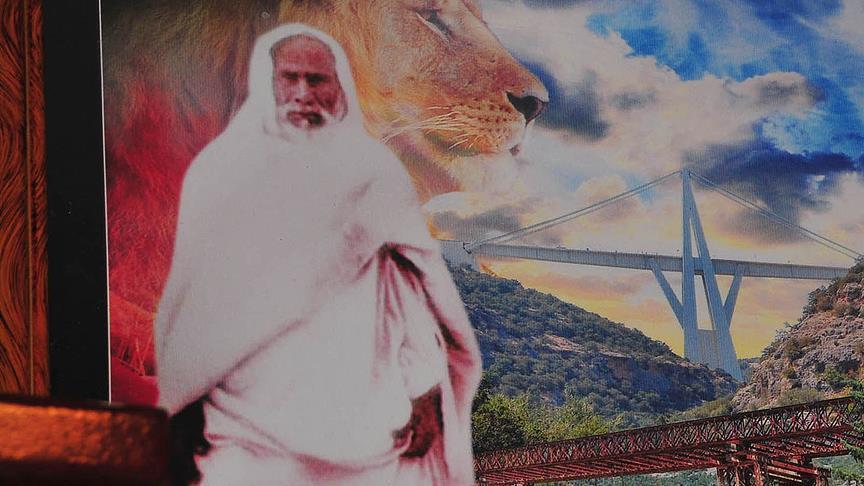86 years on, Libyans still remember their ‘Desert Lion’
It's been 86 years since the death of Omar al-Mukhtar, who led Libya’s mujahedeen against British, French, Italian invaders

Libyan
By Jihad Nasr
TRIPOLI, Libya
“Injustice turns the oppressed into heroes” -- Libyans still remember these fateful words by iconic resistance leader Omar al-Mukhtar (1862-1931), who spent the last 20 years of his life fighting the Italian occupation of his country.
Eighty-six years has passed since al-Mukhtar’s martyrdom, but he remains alive and well in Libya’s collective memory -- not only due to his role as resistance fighter, but also due to his impressive personal qualities and trademark wire-rimmed glasses.
On Sept. 16, 1931, the 73-year old resistance leader was hanged by the Italian occupation authorities after refusing to accept their terms of surrender. Ever since, he has remained a symbol of resistance against impossible odds for successive generations of Libyan youth.
Early life
A member of the Al-Manfah, one of eastern Libya’s most prominent tribes, Omar al-Mukhtar was born in 1862 in the village of Zawiyat Janzur on Libya’s eastern coast.
He lost his father when the latter died making the perilous journey to the holy city of Mecca in Saudi Arabia to perform the Hajj pilgrimage.
According to his father’s will, he was raised to manhood by Sheikh Hussein Ghariani, a religious scholar and friend of the family.
Under Ghariani’s tutelage, young Omar soon succeeded in memorizing the entire Quran by heart.
Al-Mukhtar then travelled to eastern Libya’s Al-Jaghbub Oasis, which at that time served as headquarters for the Senussian Dawa, an Islamic reformist movement founded by Sheikh Mohammed ibn Ali Senussi.
He stayed there for eight years, learning theology and Islamic science from Muslim scholars of the Senussian movement, including celebrated scholar Sheikh Al-Mahdi al-Senussi.
In 1897, al-Mahdi appointed him governor of Libya’s eastern town of Zawiyat al-Qusour, where he became known for his wisdom, fairness and ability to resolve disputes.
During this period, al-Mukhtar became known as “Sidi Omar”, or “Sir Omar” -- a title granted only to the movement’s greatest sheikhs and scholars.
Later, al-Mukhtar travelled to Sudan, where he served for several years as a deputy to Al-Mahdi al-Senussi.
Following the latter’s death, al-Mukhtar was appointed -- once again -- as sheikh of Zawiyat al-Qusour in a move welcomed by the Ottoman empire (which governed Libya at the time) due to his well-earned reputation for just leadership.
Pen to rifle
Al-Mukhtar, however, eventually transformed from a religious scholar into a resistance fighter against British, French and -- later -- Italian colonial forces.
His armed struggle first began against British forces deployed along Egypt’s border with Libya. He also fought French colonial forces who tried to invade southern Sudan and Chad in 1900.
During a war declared by Italy in 1911 against the Ottoman Empire, al-Mukhtar became known as the “Sheikh of the Mujahideen” after mobilizing 1,000 fighters from Zawiyat al-Qusour before joining the Ottoman army in eastern Benghazi.
In 1912, Rome declared Libya an Italian colony. For the next 20 years, al-Mukhtar led the Libyan resistance against the Italian occupiers, who suffered heavy losses as a result of his novel hit-and-run tactics.
Many of these clashes took place in and around Libya’s northeastern city of Derna, including a two-day battle in 1913 that left 70 Italian soldiers dead and hundreds of others injured.
Trademark glasses
In 1930, Italian forces clashed with the mujahedeen in a major battle after which they discovered al-Mukhtar’s horse and trademark wire-rimmed glasses.
It was at this point that Italian Army Commander Marshal Rodolfo Graziani made his famous statement: “Today we took al-Mukhtar’s glasses; tomorrow we will take his head.”
On September 11, 1931, during clashes with the Italian cavalry, two horses were killed out from under al-Mukhtar, according Libyan eyewitnesses.
After one of his fighters addressed him as “Sidi Omar” in the heat of battle, he was quickly identified by Italian occupation forces, who finally managed to arrest him.
Three days later, on Sept. 14, Graziani arrived to Benghazi, where he hastily convened a “special tribunal” tasked with trying al-Mukhtar.
The following day, the resistance hero was sentenced to death by hanging.
During the “trial”, when the Italians offered to let him leave the country if he called on his mujahedeen to abandon their armed struggle, al-Mukhtar uttered his most famous words:
“My forefinger, which attests at each prayer that there is no God but Allah and that Muhammad is the Messenger of Allah, cannot write a single word of falsehood. We will not surrender; we will be victorious or we will die!”
On the morning of Sept. 16, 1931, in Salouq (located some 50 kilometers south of Benghazi) al-Mukhtar was brought, handcuffed, to the gallows.
He read the Shahada -- the first pillar of Islam and a testimony of faith -- in the presence of 20,000 people who had gathered to witness the great leader’s death.
Al-Mukhtar’s remarkable life -- at least its final phase -- was depicted in the 1980 film “Lion of the Desert” starring Anthony Quinn. In a testament to the lingering political sensitivities that the figure of Al-Mukhtar still evokes, the film remained banned in Italy until 2009.
Anadolu Agency website contains only a portion of the news stories offered to subscribers in the AA News Broadcasting System (HAS), and in summarized form. Please contact us for subscription options.



